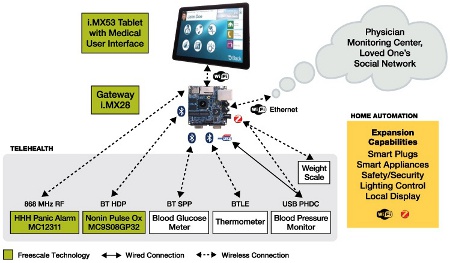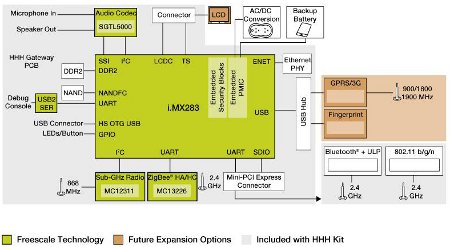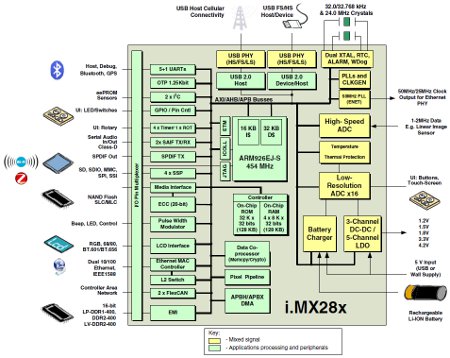Home health hub features ZigBee and sub-1GHz radios
Nov 15, 2011 — by Eric Brown — from the LinuxDevices Archive — 14 viewsFreescale Semiconductor announced a Linux-ready medical reference platform for devices that can collect and securely share health data. The Freescale home health hub (HHH) reference platform is built around Freescale's ARM9-based i.MX28 processor, integrating ZigBee and sub-1GHz transceivers as well as Ethernet, USB, Wi-Fi, Bluetooth, and Bluetooth Low Energy connectivity, says the company.
Freescale's home health hub (HHH) platform is designed to streamline the development of remote patient monitoring devices for the home. Such devices allow patients to avoid unnecessary emergency room visits, thereby saving money and helping to improve patient outcomes, says Freescale.
The need for such home monitoring devices is growing due to an aging global population, and the need to provide access to healthcare in remote regions of the world where hospitals are unavailable, says the company. The demand is said to be particularly great for the estimated 860 million chronic disease patients worldwide.

Freescale HHH board in center, with typical connections
(Click to enlarge)
The hub is primarily designed to provide secure Wi-Fi and Ethernet connectivity to remote devices running medical-specific remote user interface (UI).These could include tablets — such as Freescale's own i.MX53-based SABRE tablet reference design, proposed in the diagram above — as well as smartphones or PCs.
The HHH platform is also said to provide connectivity to healthcare devices such as blood pressure monitors, blood glucometers, weight scales, and pulse oximeters. I/O includes Freescale's MC13226V ZigBee transceiver for short-range communications, supported by ZigBee medical device stacks. In addition, the hub connects medical devices via USB, Bluetooth, and Bluetooth Low Energy, and supports medical-class-specific Bluetooth device profiles, says the company.

Freescale HHH block diagram
(Click to enlarge)
Board support packages are available for Linux and Windows Embedded Compact 7, with example code included, says Freescale. The platform also supplies pre-validated, software components for providing secure connectivity to healthcare devices. For example, the HHH software adheres to Continua device profiles to provide compatibility with other Continua-certified medical devices such as blood pressure monitors, pulse oximeters, and weight scales.
Also supported is Microsoft HealthVault, a privacy- and security-enhanced online data repository that lets users organize, store, and share health information, says Freescale. In addition, Digi International's iDigi Telehealth Application Kit is available as an option in a version customized for the platform.
The software features of the Freescale HHH are said to include:
- automatic reporting of vital sign measurements
- cloud connectivity and secure integration into medical vaults
- pervasive mobile device access
- daily activity alarms, security alarms, and passive monitoring of safety sensors for early detection of injury or security risks
- consultation with monitoring center, medical staff, family, and friends
- access to trusted health resources
- user interface for a remote display
i.MX28 background
Announced in Sept. 2010, the 454MHz i.MX28 system on chip (SoC) has appeared in Freescale's Home Energy Gateway (HEG) "smart grid" reference platform, as well as Direct Insight's Triton-TX28 module. The i.MX28 — including the base-level i.MX283 variant used here — consumes less than half a Watt, and offers clock-synchronized Ethernet, says Freescale.

i.MX28 block diagram
(Click to enlarge)
Availability
The Freescale HHH appears to be available now. More information may be found at Freescale's HHH product page. More information on Digi International's optional iDigi Telehealth Application Kit ($499) may be found at the Digi website.
This article was originally published on LinuxDevices.com and has been donated to the open source community by QuinStreet Inc. Please visit LinuxToday.com for up-to-date news and articles about Linux and open source.